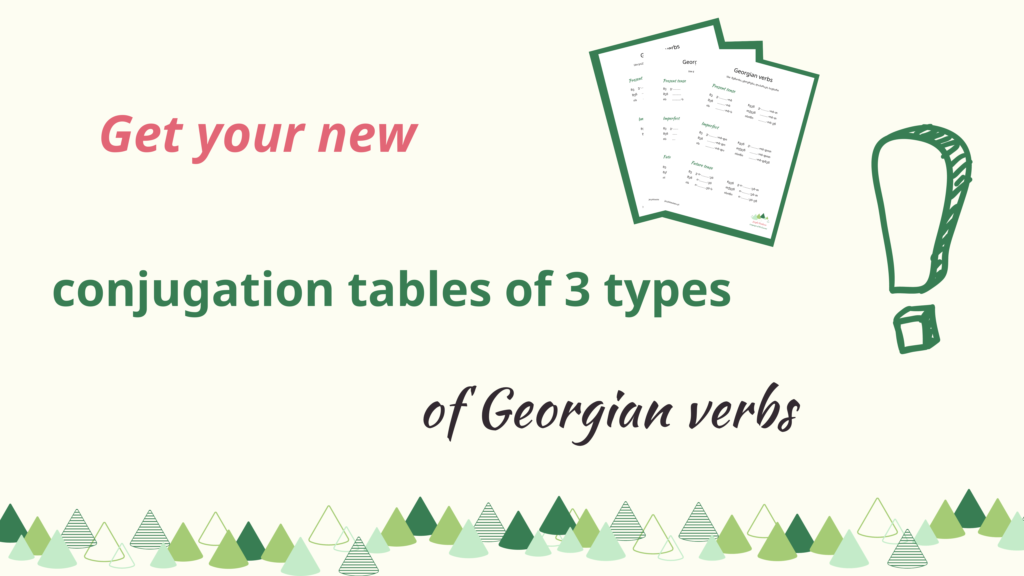Knowing Georgian verbs of movement enables you to communicate in many daily situations in Georgia. That’s why we’ll learn today how to use and conjugate it as well as the example sentences with it.
Let’s start with what Georgian verbs of movement are. We are talking here about a big group of verbs that indicate you doing any movement. In this article we’ll focus on two of those – „to go” and „to come”. Other that are in the Georgian verbs of movement group are e.g. „stand up”, „sit down”, „go up” or „come out”.
Why is it beneficial to remember “Georgian verbs of movement” are a separate group of verbs? Although those verbs often have not so similar and not so regular conjugation, they are similar, as far as cases and prefixes are concerned. As a result we can learn those faster, because the new ones will use part of the knowledge you already have. So you learn Georgian quicker.
How to use verb “to go” in Georgian?
As the first one we’ll take „to go” so წასვლა.We can use it no matter if we go by foot or by any means of transport. In general we use it similar to English, so about moving on the surface.
A bit worse piece of news is that it’s not really regular and looks a bit (or a lot) different in different tenses in comparison to the other verbs. The better piece of news is that the verbs connected with it, e.g. to go in, go out or go down will conjugate exactly the same. So once you learn წასვლა, it’s almost like you know all of them. This is one of the reasons we say Georgian verbs of movement are like a separate group of verbs.
Let’s now look at the conjugation in present tense:
მე მივდივარ
შენ მიდიხარ
ის მიდის
ჩვენ მივდივართ
თქვენ მიდიხართ
ისინი მიდიან
If you already know the verb „to be” learning our new verb will be even easier. The prefix მი– shows us the direction about which we speak. Either it means going somewhere in general or going from the person who speaks in the opposite direction. Exactly this is typical for the Georgian verbs of movement – by adding different prefixes we indicate the direction

How does the verb to come looks like in Georgian?
This time I will start with good news. The verb to come conjugates exactly like „to go”. The infinitive form is მოსვლა, so even this is very similar to what we saw in the first one we learned today, so “to go”.
The verb მოსვლა is used when you want to say that someone moves (on foot or any other means of transport on the ground) in the direction of person speaking or the direction where our story takes place. So almost exactly like verb “to come” in English.
How does the conjugation of this verb look like in present tense?
მე მოვდივარ
შენ მოდიხარ
ის მოდის
ჩვენ მოვდივართ
თქვენ მოდიხართ
ისინი მოდიან
Isn’t it just great how similar those are? You just change the prefix (because you change the direction of the movement) and the rest remains exactly the same. That’s an another benefit of learning similar verbs and schemas connected with them.
So there’s nothing left but the examples of sentences with Georgian verbs of movement.
How do the Georgian verbs of movement look like in sentences?
I have chosen for you 3 constructs most often used with today’s verbs. Each of the suffixes we’ll use below will have soon a separate article, so now we won’t focus a lot on those as such.
I go to Tbilisi in Georgian
The most typical sentences and one of the easiest you can create with today’s verbs. This sentence is created by adding –ში to the name of the place, so
მე თბილისში მივდივარ.
I go to Tbilisi. In Georgian we do not have to add the personal pronouns, because you know the person already by the verb’s form. In our articles here we add very often though, just to help you distinguish the new verbs.
How to ask: Where do you go? It will look like that: სად მიდიხარ? And the question about bus from the title of today’s article will look like that: ეს ავტობუსი სად მიდის?
I go to Batumi by car in Georgian
The second, very useful phrase about the means of transport you may go with. What you need to say it is the 5th case of Georgian noun. This case shows by using what you conduct some actions. So the whole sentence looks like this:
ბათუმში მანქანით მივდივარ.
As you may see, we have already used new piece of information from the previous sentence. This is also a great way to study Georgian – connecting the new with what you already learned. So how would the question “How (by what) do you go?”. Here you need additional word – რით – ბათუმში რით მიდიხარ?
I go from Kutaisi in Georgian
Let’s look at the last sentence for today, so „going from somewhere”. To create a phrase like this you need – იდან suffix which you add to the name of the place. So the above mentioned sentence in Georgian will be as follows:
ქუთაისიდან მივდივარ.
The corresponding question will be საიდან მიდიხარ?
I leave you with the small exercise in the end. Try to create your own sentence using all 3 constructs. You can send it to me via e-mail – sing up to our newsletter Caucasian mail and reply to the welcome e-mail. Then I can check it for you and send you feedback. Also let us know if you like Georgian verbs of movement!
If you want to learn not only the present tense, but also other ones of those 2 verbs, check out our e-book “50 Georgian verbs” where those are conjugated and provided with example sentences for each verb form.
